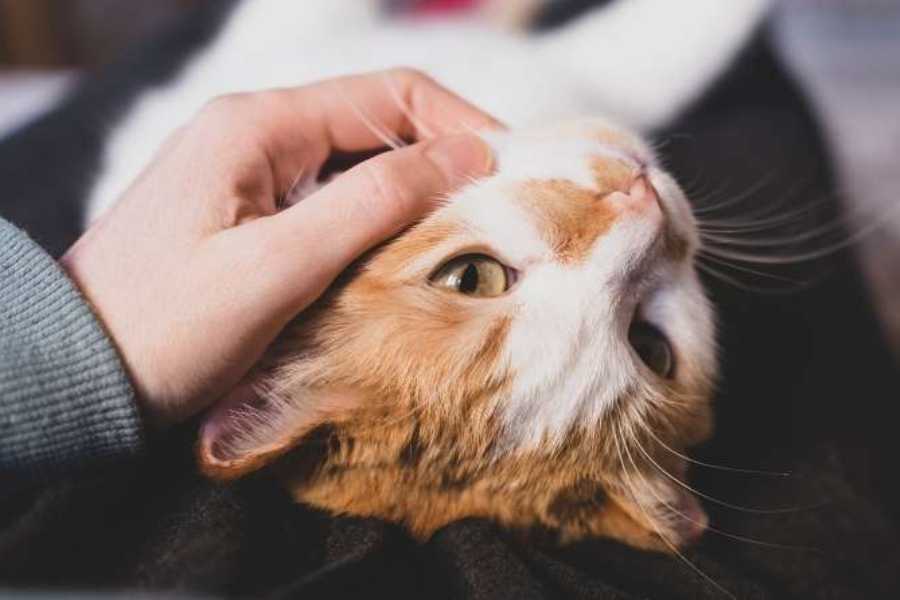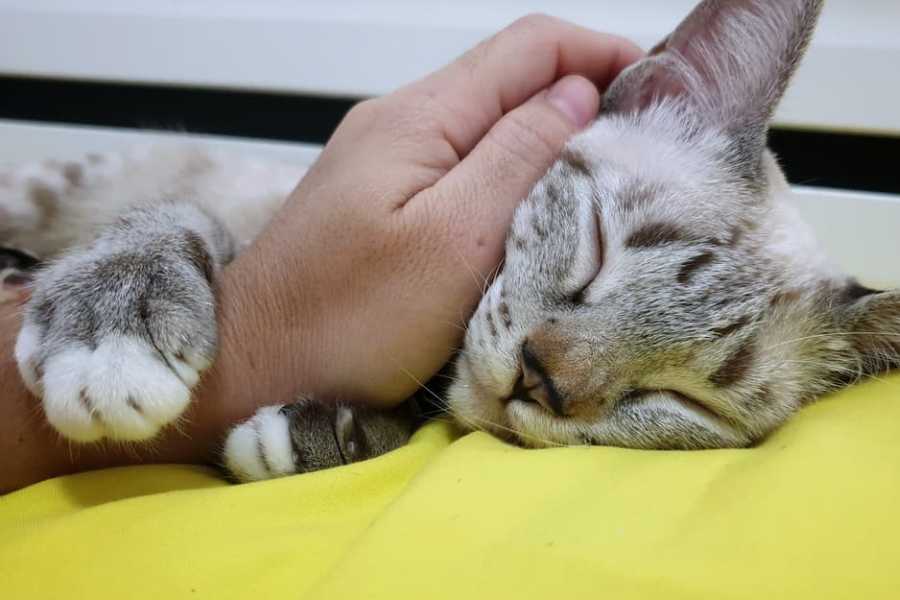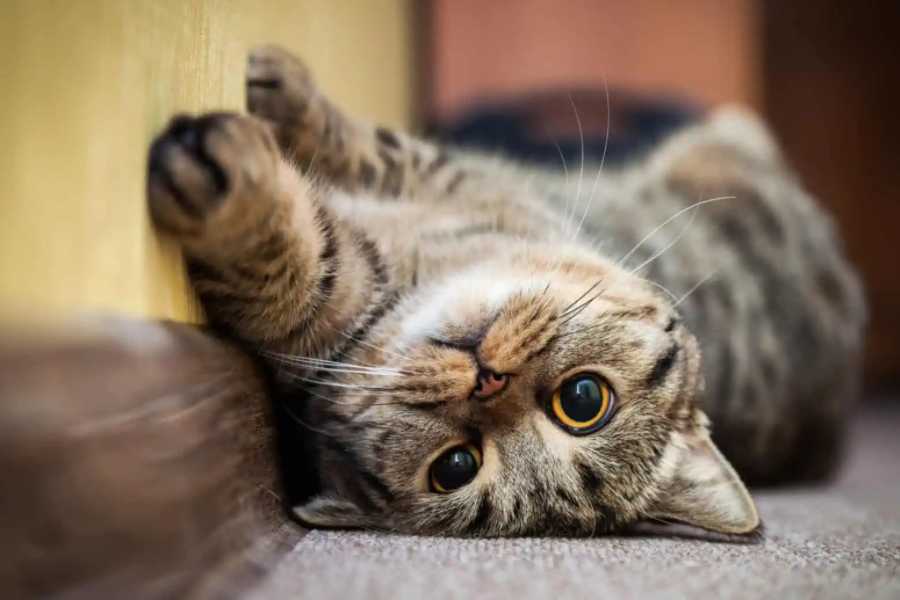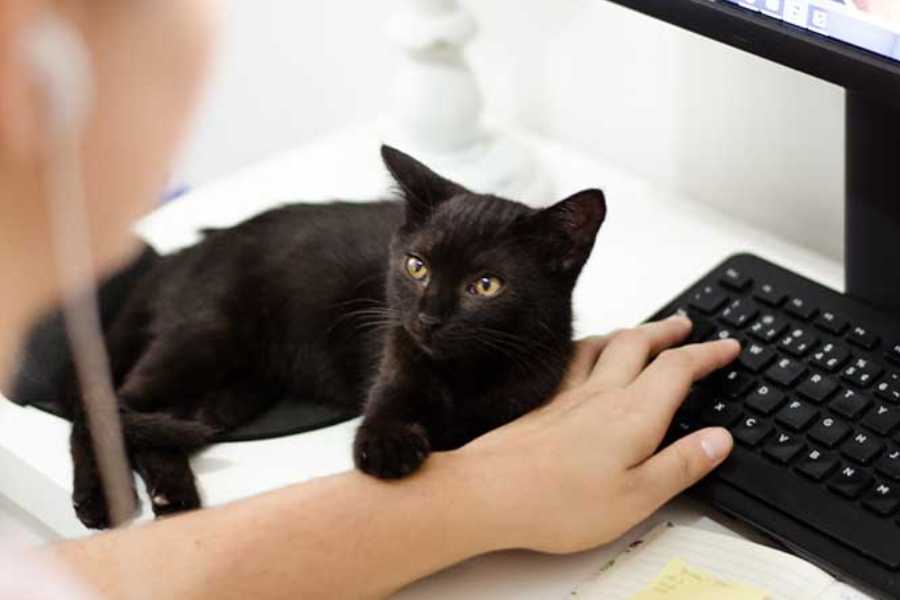Why is My Cat so Clingy? A Guide to Overly Needy Cats 🧍🐈

If your feline friend sticks to you like glue, you’ve probably got a clingy cat on your hands. ![]()
Whether or not this is a good thing depends on a few factors, including your perspective and the reasons your cat is clingy.
To some cat parents, any cat that exhibits more dog-like behaviors such as following you around the house, running to greet you when you come home, or being extra affectionate is considered clingy when compared to cats who are more independent and aloof.
But some cats can be clingy to an unhealthy degree. So, how can you tell the difference? Let’s dive in!
Signs of Clinginess in Cats 🐾

Clingy cats exhibit a range of behaviors that signal their need for constant attention. Here are some signs to look out for:
- Following you everywhere, including to the bathroom.
- Wanting to constantly be on you when you’re sitting or lying down.
- Meowing constantly to get your attention.
- Demanding affection when you’re trying to focus on something other than them.
- Refusing to eat when you’re not there.
- Acting shy and sticking close to you when visitors come over.
- Sulking or hiding when you’re getting ready to leave or rubbing against your legs in an attempt to keep you there.
- Getting overly excited when you return home.
- Eliminating outside the litter box and other destructive behavior.
If your cat is showing these signs, it’s important to understand why. This behavior could be a sign of underlying issues, or it could just be part of their personality.
Why Are Some Cats Clingy? 🤔

Some cats are simply clingy by nature, with some purebred cat breeds like the Siamese and the Abyssinian known for their clingy personalities. But in some cases, clinginess can be a sign that something is up with your kitty.
Therefore, it’s important to pay attention to what might be causing this behavior. One or more of the following causes might be behind your kitty’s clinginess:
Boredom
Your cat might be clingy simply because they aren’t getting enough mental and physical stimulation. Taking breaks to play with your cat and providing interactive toys to help keep them active and entertained throughout the day can help in these cases.
Premature Weaning and Separation
Kittens can develop separation anxiety from being weaned too early or from being taken from their mothers and litter mates before they’re ready.
Kittens typically move from mother’s milk to solid food around eight weeks of age, but adopting them as soon as they’re weaned can prevent them from learning important social skills from their mother and siblings. This can set them up to be more secure and independent as adults.
Insecurity
Cats are routine-oriented, and any change in their routines or environment can make them feel insecure and send them looking to you for reassurance. Big changes like moving to a new home, the addition or loss of another pet or family member, or kids going back to school after a long vacation can be enough to make your kitty need the reassurance of constant contact.
Newly rescued cats may also need a lot of reassurance that they’re wanted and welcome in their new home.
Wanting to Provide Comfort
Cats are highly sensitive to human moods and emotions. It could be that your kitty senses that you’re going through a difficult time and wants to be there to comfort you and make sure you’re okay.
Pregnant Pet Parent
Some cats have an uncanny ability to sense when a woman is pregnant and become extremely affectionate throughout the pregnancy.
Exactly how a cat can tell there’s a baby on the way is a mystery, but if you’re expecting, don’t be surprised if your kitty wants to snuggle up to your baby bump.
Lack of Enforced Boundaries
Some clingy kitties are simply spoiled. If you pamper your kitty by giving in to all of their demands, you’ll reinforce their clingy, demanding behavior by teaching them they can easily manipulate you to get what they want.
Underlying Health Issues
Dementia in elderly cats can cause them to become clingy. This can also indicate other health problems. A neurological condition known as cerebellar hypoplasia (CH) tends to make cats exceptionally cuddly and attention-seeking, and it’s usually accompanied by balance issues and lack of coordination.
How to Help an Overly Clingy Cat 🐱👓

While it can be nice to have a highly affectionate pet, some cat parents find that overly clingy and demanding behavior is disruptive. If this is the case, you’ll need to take steps to help your kitty be less clingy and more independent.
And if your formerly aloof cat has suddenly begun displaying signs of clinginess, pay attention to other signs that could indicate health problems.
In general, anytime your cat has a sudden change in behavior, it’s a good idea to consult your veterinarian.
Identify the Cause
While it might be obvious, you may need to do some detective work. Keep in mind that cats are so sensitive to change that something as seemingly minor as getting a new sofa or rearranging the furniture can cause your kitty distress.
Consult Your Vet
If you suspect health issues might be involved, schedule a checkup with your vet. They can also help determine whether separation anxiety resulting from premature weaning is the cause and advise you on how to treat it.
Set Firm Boundaries and Enforce Them
Close the bathroom door behind you, don’t give in to every demand for attention, and make your lap available on your terms, not your kitty’s.
Schedule Playtime
Provide toys to relieve boredom when you’re busy or away from home. Place a perch next to a busy window for birds and people watching. If this isn’t possible, search online for videos for cats, which can help keep your cat entertained while you get other things done.
Consider Adopting Another Cat
While some cats thrive on being only pets, clingy cats can benefit from having another kitty around to keep them company. This is especially true for cats who become clingy after the loss of another household pet.
Additional Tips to Handle a Clingy Cat 🐱👓

If you notice your cat is too clingy, here are some practical tips which may help:
Rule Out Any
Ailment or Physical Pathology
When there is a behavioral problem, the first thing to do is rule out whether the cat is suffering from a physical ailment or pathology.
Some diseases manifest themselves in behavioral changes of the animal, including being more demanding of attention than usual. A checkup with a veterinarian can help assess the physical well-being of the cat.
Enrich Their Environment
Interactive games, stuffed toys, jumping platforms, climbing towers, and other environmental enrichment keep your cat entertained while stimulating them physically and mentally.
They meet their basic needs as a species, so they are a great ally when it comes to encouraging play and entertaining themselves when you’re not there.
Let Them Explore
Even if you fear something may happen to your cat, you should avoid overprotecting and isolating them. Cats are curious animals by nature, and it’s important we encourage exercising their instincts in a healthy way by exploring independently.
They gain confidence and self-assurance. To avoid accidents, you can place guards on windows or patios so they cannot escape or even try taking them for a walk in a harness.
Don’t Ignore Them
Many people try to reduce their cat’s dependency by ignoring them and avoiding physical contact. In doing so, the animal may become increasingly anxious.
It’s important you create a healthy relationship with your feline, that you play with them and provide affection so they know they can continue when they need it. And at the same time, we use patience to show they cannot always get what they want.
Avoid Any Type of Punishment
Never yell or scold your cat if they show symptoms of anxiety or dependency on you. Clinginess is related to emotional discomfort and a lack of security, so the last thing they need is to be punished for expressing themselves. Try to understand your cat and if you consider it necessary, contact a professional.
Use Products to Reduce Stress
Some products such as feline pheromones or catnip can have an anxiolytic effect on cats and help them cope with times of stress.
These should always be accompanied by behavioral modification guidelines. Specific drugs for the treatment of these cases should only be administrated under the prescription of your veterinarian or ethologist.
Conclusion 🎯

It’s nice when your kitty is affectionate and wants to be with you, but too much of a good thing can be a problem. Taking steps to help your kitty be less clingy can help both of you be happier and may even help your kitty be healthier in the process.
Whether you’re raising a kitten or nurturing an adult cat, most strategies will work as long as you do them with genuine love and concern.
Remember, owning a cat is a big responsibility and not just a hobby that you can set aside once you’ve grown tired of it. Patiently caring for your cat and employing the above methods will help you bring out the best in your cat. A happy and healthy cat will be much easier to care for, making it a wonderful addition to your home.
For more information on cat behavior and health, check out our other articles on pawsadviser.com. We have a wealth of resources to help you understand your feline friend better, from why cat has tongue out understanding the adorable cat blep to what shots are needed for cats everything you need to know about cat vaccines.
Remember, you’re not alone in your cat parenting journey. We’re here to help you make the best decisions for your pet. After all, a well-informed pet parent is the best kind there is! ![]()
Tags
Share
Table Of Contents
Related Posts
Quick Links

